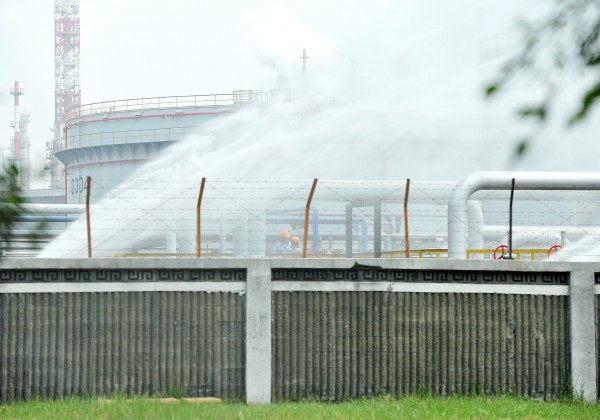《TAIPEI TIMES 焦點》 Kaohsiung passes draft linking pipelines to HQs

Firefighters spray water at CPC Corp, Taiwan’s Dalin factory in Kaohsiung to prevent an accident following a propylene leak yesterday. The Kaohsiung City Government’s industrial pipe network management act yesterday won the support of a majority of councilors. Photo: Huang Chih-yuan, Taipei Times
‘PUBLIC SAFETY FIRST’: The draft would require companies with pipelines in Kaohsiung to base their headquarters there, but the MOEA says the rule may violate property rights
By Alison Hsiao and Lauly Li / Staff reporters
The Kaohsiung City Government passed a draft of the self-government ordinance on the management of Kaohsiung’s existing industrial pipelines (高雄市既有工業管線管理自治條例) on Tuesday that requires companies laying pipelines in Kaohsiung to locate their headquarters there — sparking questions over its constitutionality.
“The ordinance does not compel corporations with petrochemical pipelines to station their headquarters in Kaohsiung, as they are free to choose whether to keep their pipelines, which are to be approved and managed by the local government, in Kaohsiung. However, if the pipelines are to stay in Kaohsiung, the corporations will have to have their headquarters in Kaohsiung,” Kaohsiung Legal Affairs Bureau Director Hsu Nai-dan (許乃丹) said at a press conference when addressing the issue of constitutionality.
Hsu added that the Ministry of Economic Affairs (MOEA) has been saying that there is a lack of proper regulation on petrochemical pipelines and that it aims to amend the law to make the pipelines “extensions of factories’ equipment.”
“The amendment would grant these illegal pipelines legality on the spot, but it has no regard for residents’ safety. The government is — in no violation of the Constitution — setting up regulations regulating these illegally buried pipelines to put public safety first, while there are still misgivings about the central government’s proposed amendments,” Hsu said.
The city government passed the draft ordinance in the wake of gas pipeline explosions that left 32 dead and hundreds injured in Kaohsiung last year.
City officials defended the regulations as necessary for Kaohsiung residents’ safety.
Kaohsiung Economic Development Bureau Director Tseng Wen-sheng (曾文生) said that while the public pipelines for water, gas and electricity are legally registered, there are 89 industrial pipelines in Kaohsiung that have been off the legal grid for years.
He went on to say that, during the explosions, one corporation’s various departments had problems communicating with each other, with devastating effect to the response.
“With the headquarters relocated to Kaohsiung, they could be close to the sites and streamline the communication,” Tseng said.
“The existing laws regulate only road-digging and its approval, but are insufficient when it comes to the management of the pipelines after they are buried,” Kaohsiung Deputy Secretary-General Chen Hung-yi (陳鴻益) said. “The new ordinance is to regulate the management and the use of the industrial pipelines, and only the pipelines, as the transport and use of tank trucks will not be affected.”
At a separate press conference in Taipei, the ministry yesterday said it is a petrochemical company’s responsibility to maintain the safety of its petrochemical pipelines, adding that there is no direct relation between the location of a company’s headquarters and its responsibilities.
“Kaohsiung’s regulations may affect industries’ choices to set up headquarters in Taiwan and consequently influence companies’ willingness to invest in the nation,” Vice Minister of Economic Affairs Shen Jong-chin (沈榮津) told reporters, adding that it may violate constitutional principles regarding an individual’s property rights and their right to run a business.
State-run oil refiner CPC Corp, Taiwan (CPC, 台灣中油) said the company had already established an office in southern Taiwan after the deadly gas explosions, adding that it plans to set up a center in southern Taiwan this year to ensure the safety of its petrochemical pipelines.
CPC said it respected the Kaohsiung City Government’s decision and that it would carefully evaluate the possibility of moving its headquarters to Kaohsiung.
新聞來源:TAIPEI TIMES





















